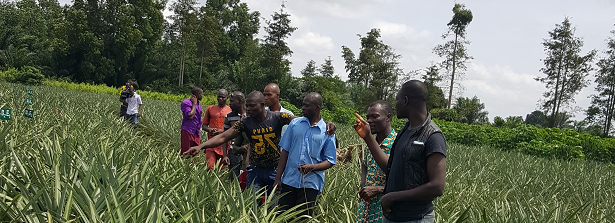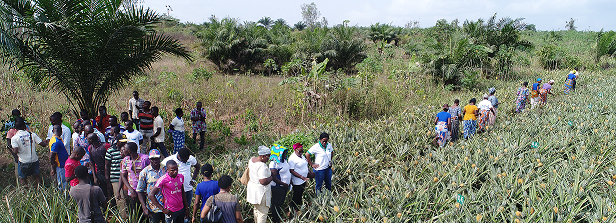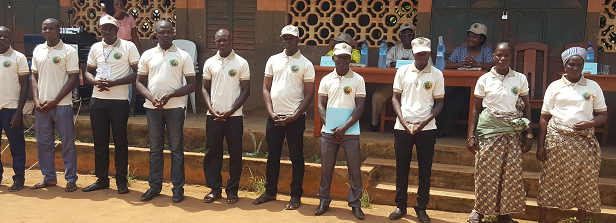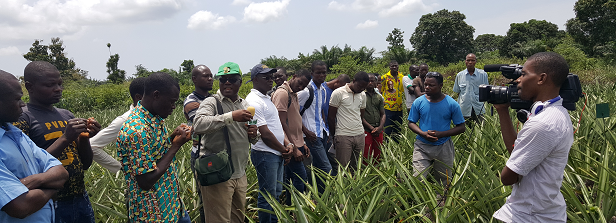Agronomic and processing practices for pineapple in Benin (DAPIS)

Duration: October 2015 – September 2019. This project has been finalized.
Project information
Aim: Pineapple producers, fresh pineapple exporters, traders and processors in chains to local, regional and international markets are facing problems in selling their fresh pineapple or derived products. The current project aims at improving the quality of fresh pineapple and pasteurised pineapple juice for local, regional and international markets. The project will combine crop sciences and food sciences to (i) determine appropriate agronomic practices yielding fresh fruits meeting markets requirements and (ii) determine appropriate processing technologies delivering stable pasteurised pineapple juice for local and regional markets.
Objective: General objective is to better access of fresh pineapple and pasteurised pineapple juice produced in Benin to local, regional and international markets.
Specific objectives are:
- Fresh pineapple quality attributes and criteria for pineapple producers, wholesalers, retailers and processors in local, regional and international markets defined.
- Pineapple agronomic practices that meet local, regional and international markets established.
- Pineapple juice processing technologies that meet the local and regional market demand established.
- Appropriate (low cost) pineapple agronomic and processing practices that meet local, regional and international markets determined.
- Appropriate pineapple agronomic and processing practices for local, regional and international markets disseminated.
Method: The project is organized in 6 work packages (WP1-6), out of which four relate directly to the research questions, whereas the remaining two concern the coordination of all project activities and the dissemination of project information:
- WP1. – Pineapple quality attributes and criteria for stakeholders (producers, traders and processors) in local, regional markets and international markets.
- WP2. – Agronomic practices for fresh pineapple fruit and pasteurised pineapple juice.
- WP3. – Juice processing technologies for the local and regional markets.
- WP4. – Cost-benefit analysis on agronomic and processing practices.
- WP5. – Outputs dissemination
- WP6. – Project coordination
Country: Benin.
Dutch policy goal: Increased sustainable agricultural production.
Progress reports
Year 2: The outcome of the first year which was the definition of the pineapple quality attributes preferences of each actor in the chain, has helped to design food technology and agronomic experiments. As a progress, some field experiments taking into account the producers cultural practices and cultural practices from research finding were implemented. The objective was to evaluate the effect of planting density and fertilizers amounts on the overall quality of the pineapple especially the yield and the pineapple size. On the 21st of September 2017, the producers visited the different experiment and has made a good conclusion on the potential cultural practices that will help them to improve the quality of the pineapple on the field. As far as the technology study is concerned, the existing processing technologies were identified and the quality of the existing pasteurised pineapple has been investigated in collaboration with processors. Later, a processing technology will be optimized following by the good manufacturing practices.
Final report
Summary of the results: In Benin, pineapple stakeholders complained about the short shelf-life (~3 days) of the fruit, the poor juice quality, and the low fruit yield (~47.5 tons. ha-1). The DAPIS project aimed at improving the quality of fresh pineapple and pasteurised pineapple juice in Benin. The consortium members included research organisations (UAC/FSA in Benin and WU/FQD & CSA in the Netherlands), fruit processing enterprise (Magnificat Group) and stakeholder organisation (Table Filière Ananas, a Pineapple stakeholder’s platform in Benin). Agronomic practices were co-developed with stakeholders to produce acceptable pineapples with a shelf-life of 10 days on average with a yield of 75.6 tons. ha-1 and 84.6 tons.ha-1 (planting density of 66600 plants.ha-1/74000 plants.ha-1 plus fertiliser management of K2O:N=1). With these practices, producers can obtain a profit of 1,084,370 FCFA/ha (1653.12 Euros/ha) or 1,411,630 FCFA/ha (2152.02 Euros/ha). Pineapple fruits produced at 54400 plants/ha (65.8 tons. ha-1) with a K2O: N=1 gave the sweetest fresh fruit and pasteurised juice preferred by most consumers. Pineapple juice can be pasteurised at low temperature (75 °C) for a limited storage period of 4 months while the juice produced in the range of 80 °C – 85 °C can be stored for 10 months and stays rich in vitamin C.



